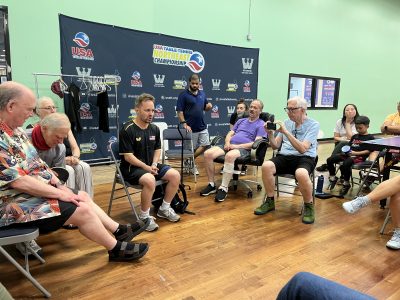Tennis Paralympic Champion Rises From the Streets to Win Gold
News Based on facts, either observed and verified directly by the reporter, or reported and verified from knowledgeable sources.
By Anna Carpinelli

At the age of 14, Tahl Leibovitz began a struggle with homelessness that would pervade his life for the next seven years.
Today, he is a world-renowned American table tennis player, six-time Paralympian, World Champion competitor and an author.
Last Monday, July 15, only a couple of days before he left for Paris to compete next month in the Paralympics, a book launch party was held for Leibovitz’s newly-released memoir, “The Book of Tahl: From Homelessness to Paralympic Gold” at the Westchester Table Tennis Club in Pleasantville. The club’s owner, Will Shortz, the well-known crossword-puzzle creator, wrote the forward for the book.
During the celebration of his memoir’s release, Leibovitz had many to thank, most notably his editor, table tennis student and friend, Jim Bergman. A work in progress since 2010, Leibovitz’s account is a transcription of hundreds of interviews conducted between himself and Bergman. Leibovitz claimed that the release would not have been possible without him.
This is not his first book. In 2017, Leibovitz released “Ping Pong for Fighters: Gold Medal Edition,” a guide on how a Paralympic gold medalist understands the sport of table tennis.
However, as the title suggests, his newest release is much more personal, detailing a life of struggle that has ultimately resulted in overwhelming success.
Due to complications at birth, Leibovitz, who stands 5-foot-3, was born with severely deformed feet. He also has genetically-inherited osteochondromas (non-cancerous bone tumors throughout his body) and hyperhidrosis, a condition that causes excessive perspiration.
After enduring years of psychological and physical abuse from his parents, Leibovitz, 49, left home, with no more than a few articles of clothing, a toothbrush and his table tennis racquet.
Throughout his time being homeless, in addition to struggles with insufficient food, sleep deprivation and unforgiving weather conditions, Leibovitz was the victim of constant crime and violence.
“I was growing up on the streets. A lot of people I was friends with were dealing drugs, robbing people, in and out of jail. They were very violent,” he said.
However, Leibovitz, who was born in Israel before migrating with his family to New York at four years old, never succumbed to the streets. Instead, he began playing table tennis at the South Queens Boys & Girls Club. He mentioned several times that his interest in the sport and his desire to excel saved him.
“Table tennis took me away from (drugs and crime), it was something I was doing all the time; I was obsessing over it,” Leibovitz said. “I was watching videos, trying to get better. When you focus that much time into something, even when you’re not playing, it takes all of you.”
Leibovitz recalled the 1998 New York State Championship in Queens as a defining moment in his life. Leibovitz competed against many of the best players in New York City at the time and captured the title.
From there, his love for the sport deepened. On and off the court, through hours of physical conditioning, player analysis and practice, Leibovitz became a fearless competitor, a characteristic that eventually allowed him to qualify for the Paralympics.
He’s attended six Paralympics, and earned a gold medal and two bronze medals in 1996.
Leibovitz said it wasn’t motivation that kept him going.
“There’s a difference between motivation and discipline for something,” Leibovitz explained. “Motivation is always good, but it runs out. It has to be something a bit bigger than that. I think what helped me – what was bigger than that – was I didn’t like to lose matches. I kept trying to find a way to compete better. The motivation was not losing, finding a way to win.”
A licensed clinical social worker, Leibovitz strives to help individuals attain their long-term goals, just as he has. His favorite part of the job has been seeing the people he counsels achieve their goals that they may have strived to attain for years.
But Leibovitz said that life isn’t only about victories.
“I think if people are easier with themselves, easier with other people, we’d be better off,” he said. “Accepting self, suspending judgment of self, how you relate to yourself and do the best that you can. We all share the human condition; we all just do the best that we can.”
To learn more about Tahl Leibovitz, visit https://www.teamusa.com/profiles/tahl-leibovitz-799995. His memoir can be bought on Amazon.

Examiner Media – Keeping you informed with professionally-reported local news, features, and sports coverage.
